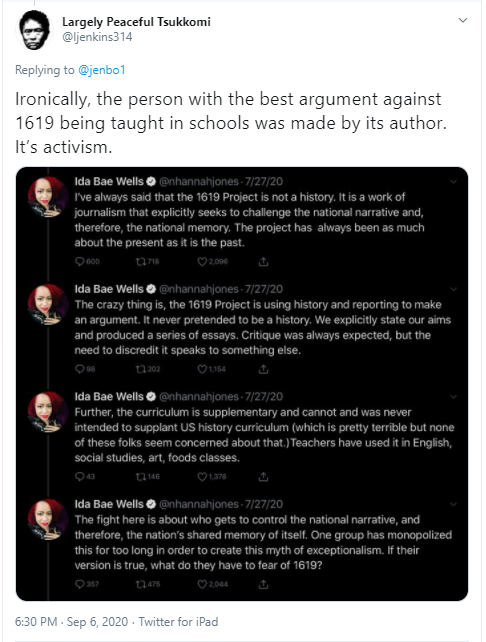Journalist Christopher Rufo Discusses the Dangers of Critical Race Theory with Dave Rubin
Critical Race Theorists are getting their way in many institutions in the form of forced "training" for unwilling students and employees. CRT advocates are largely getting a free pass on this trend. Many people who have serious concerns about CRT's ideological foundation and tactics are afraid to speak up for fear of losing their jobs, for legitimate fear of being canceled in other ways or for a well-documented fear of being branded "insensitive" or "racist."
CRT advocates proudly embrace the idea that one can determine another person's character by simply noticing immutable characteristics such as skin color. In short, CRT advocates claim to be are fighting racism, but they do this by employing racism. CRT thus has a lot in common with astrology: both approaches assert that one can understand another person by reference to something purely accidental (whether it be a skin tone or a birth date). Both approaches lack scientific validity and CRT is setting the civil rights movement back by decades by trashing Martin Luther King's dream that we will one day judge each other by content of character. Unfortunately, CRT has gained critical mass in many schools, corporations and government offices, which now invite forced CRT indoctrination of their students and employees.
Christopher Rufo is a journalist who has declared war on this trend. He discusses CRT principles in this video, then bemoans the fact that thoughtful liberals are not able or willing to criticize the movement for fear of being called names or losing social status or employment:
15:31
Rubin: Do you sense that the liberals have any defense against this? I think this is where i have a bit of a difference with some of my friends in this where I think some of them still think the liberals have some defense mechanism against this. I simply don't believe that anymore. I think i it's either the conservatives and in a weird way, it's Trump or or bust. What do you think about that?
Rufo: Yeah, I 100% side with you. I think that what we've seen in Seattle and San Francisco and Los Angeles, that the kind of old-line liberals or the kind of moderate liberals really have no ability to push back or even restrain the most extreme progressive ideologues. That kind of experience in the last 10 years in these very liberal cities on the west coast is now being nationalized in our discourse and, frankly, Joe Biden is not going to offer any kind of restraint against this. It's completely naive and absurd to think so. It's also kind of naive and absurd to think that there's some great third party unity ticket that could fight against it. The kind of brass tacks of it is that dissident liberals, mainstream liberals--they have to to create an alliance with conservatives in order to stop this. I'm encouraging all of my friends on the center left to move over and forge an alliance at least on these critical issues with us within the conservative movement because the bottom line is really this uh kind of writing an op-ed no matter how good it is kind of appealing to civil discourse appealing to restraint, appealing to the center, is not going to change the minds of the fundamentalists who are running the kind of intellectual architecture of the left and they have to basically make the decision we are going to tactically align with conservatives to stop this.
Many of Rufo's conclusions align well with the opinions of many on the dark web, many of whom are now considered "dissident" liberals because they believe in traditional liberal values, but not the pernicious ideas of CRT. As far as defining "traditional liberal values," consider Jonathan Haidt's description:
I think young people are losing touch with some of the hard-won lessons of the past, so I’m not going to say “Oh, we have to just accept whatever morality is here.” I still am ultimately liberal in the sense that what I dream of is a society in which people are free to create lives that they want to live. They’re not forced to do things. They’re not shamed. There’s a minimum of conflict and we make room for each other. If we’re going to have a diverse society, we’ve really got to be tolerant and make room for each other. That’s my dream. I think in the last five or ten years, we’ve gotten really far from that.
For another lengthy and robust conversation regarding the danger of critical race theory, consider this Making Sense podcast, in which Sam Harris interviews John McWhorter: #217 - THE NEW RELIGION OF ANTI-RACISM. . Sam Harris has been a shining light on these issues of Wokeness for many months. Making Sense has a paywall, but I'd ask you to consider making the investment. If you can't afford it, write Sam an email and he'll give you free access for a year.
I'll end with this recent political development: Donald Trump "has just signed a full Executive Order abolishing critical race theory from the federal government, the military, and all federal contractors." This is an era of strange bedfellows. I can't think of a person I detest more than Donald Trump, yet I think this executive order is an appropriate step. Perhaps this order will provoke real and nuanced public conversations about the aspirations and dangers of CRT in lieu of institutional bullying and infinite varieties of ad hominem attacks in reply to sincere criticism. For more, see Rufo's article from yesterday (with the full executive order) here.
To clarify - Rufo and Rubin urge voting for Trump on this one issue. I have never voted for anyone based on one issue, and Trump's maliciousness, mendaciousness and corruption will keep me from voting for him even if I think he made one appropriate move on CRT.


